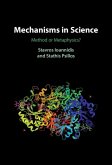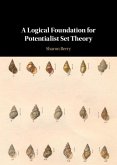Philosophy of Science for Biologists (eBook, PDF)
Redaktion: Kampourakis, Kostas; Uller, Tobias
29,95 €
29,95 €
inkl. MwSt.
Sofort per Download lieferbar

15 °P sammeln
29,95 €
Als Download kaufen

29,95 €
inkl. MwSt.
Sofort per Download lieferbar

15 °P sammeln
Jetzt verschenken
Alle Infos zum eBook verschenken
29,95 €
inkl. MwSt.
Sofort per Download lieferbar
Alle Infos zum eBook verschenken

15 °P sammeln
Philosophy of Science for Biologists (eBook, PDF)
Redaktion: Kampourakis, Kostas; Uller, Tobias
- Format: PDF
- Merkliste
- Auf die Merkliste
- Bewerten Bewerten
- Teilen
- Produkt teilen
- Produkterinnerung
- Produkterinnerung

Bitte loggen Sie sich zunächst in Ihr Kundenkonto ein oder registrieren Sie sich bei
bücher.de, um das eBook-Abo tolino select nutzen zu können.
Hier können Sie sich einloggen
Hier können Sie sich einloggen
Sie sind bereits eingeloggt. Klicken Sie auf 2. tolino select Abo, um fortzufahren.

Bitte loggen Sie sich zunächst in Ihr Kundenkonto ein oder registrieren Sie sich bei bücher.de, um das eBook-Abo tolino select nutzen zu können.
A short and accessible introduction to philosophy of science for students and researchers across the life sciences.
- Geräte: PC
- mit Kopierschutz
- eBook Hilfe
- Größe: 5.61MB
- FamilySharing(5)
Andere Kunden interessierten sich auch für
![Money-Pump Arguments (eBook, PDF) Money-Pump Arguments (eBook, PDF)]() Johan E. GustafssonMoney-Pump Arguments (eBook, PDF)17,95 €
Johan E. GustafssonMoney-Pump Arguments (eBook, PDF)17,95 €![Mechanisms in Science (eBook, PDF) Mechanisms in Science (eBook, PDF)]() Stavros IoannidisMechanisms in Science (eBook, PDF)24,95 €
Stavros IoannidisMechanisms in Science (eBook, PDF)24,95 €![Biology, Religion, and Philosophy (eBook, PDF) Biology, Religion, and Philosophy (eBook, PDF)]() Michael PetersonBiology, Religion, and Philosophy (eBook, PDF)23,95 €
Michael PetersonBiology, Religion, and Philosophy (eBook, PDF)23,95 €![Complexity Science (eBook, PDF) Complexity Science (eBook, PDF)]() Henrik Jeldtoft JensenComplexity Science (eBook, PDF)39,95 €
Henrik Jeldtoft JensenComplexity Science (eBook, PDF)39,95 €![Kuhn's Intellectual Path (eBook, PDF) Kuhn's Intellectual Path (eBook, PDF)]() K. Brad WrayKuhn's Intellectual Path (eBook, PDF)24,95 €
K. Brad WrayKuhn's Intellectual Path (eBook, PDF)24,95 €![Interpreting Kuhn (eBook, PDF) Interpreting Kuhn (eBook, PDF)]() Interpreting Kuhn (eBook, PDF)24,95 €
Interpreting Kuhn (eBook, PDF)24,95 €![Logical Foundation for Potentialist Set Theory (eBook, PDF) Logical Foundation for Potentialist Set Theory (eBook, PDF)]() Sharon BerryLogical Foundation for Potentialist Set Theory (eBook, PDF)24,95 €
Sharon BerryLogical Foundation for Potentialist Set Theory (eBook, PDF)24,95 €-
-
-
A short and accessible introduction to philosophy of science for students and researchers across the life sciences.
Dieser Download kann aus rechtlichen Gründen nur mit Rechnungsadresse in A, B, BG, CY, CZ, D, DK, EW, E, FIN, F, GR, HR, H, IRL, I, LT, L, LR, M, NL, PL, P, R, S, SLO, SK ausgeliefert werden.
Produktdetails
- Produktdetails
- Verlag: Cambridge University Press
- Erscheinungstermin: 24. September 2020
- Englisch
- ISBN-13: 9781108750288
- Artikelnr.: 70911360
- Verlag: Cambridge University Press
- Erscheinungstermin: 24. September 2020
- Englisch
- ISBN-13: 9781108750288
- Artikelnr.: 70911360
- Herstellerkennzeichnung Die Herstellerinformationen sind derzeit nicht verfügbar.
1. Why should biologists care about philosophy of science? Tobias Uller and
Kostas Kampourakis; 2. What constitutes an explanation in biology? Angela
Potochnik; 3. What is biological knowledge? Kevin McCain; 4. What is the
nature of theories and models in biology? Emily Parke and Anya Plutynski;
5. How are biology concepts used and transformed? Ingo Brigandt; 6. Why
does it matter that many biology concepts are metaphors? Kostas
Kampourakis; 7. How do concepts contribute to scientific advancement?
Evolutionary biology as a case study David Depew; 8. How can conceptual
analysis contribute to scientific practice? The case of cultural evolution
Tim Lewens; 9. What methods do life scientists use? A brief history with
philosophical implications Erik L. Peterson; 10. Is it possible to
scientifically reconstruct the history of life on earth? The biological
sciences and deep time Carol Cleland; 11. What is the basis of biological
classification? The search for natural systems Thomas Reydon; 12. What is
the nature of scientific controversies in the biological sciences? Michael
R. Dietrich; 13. What is the relation between facts and values in
biological science? Biology in society Carrie Friese and Barbara Prainsack;
14. A philosopher in the age of creationism: What have I learned after
fifty years doing philosophy of biology that I want to pass on to
biologists Michael Ruse; 15. How can we teach philosophy of science to
biologists? Kostas Kampourakis and Tobias Uller.
Kostas Kampourakis; 2. What constitutes an explanation in biology? Angela
Potochnik; 3. What is biological knowledge? Kevin McCain; 4. What is the
nature of theories and models in biology? Emily Parke and Anya Plutynski;
5. How are biology concepts used and transformed? Ingo Brigandt; 6. Why
does it matter that many biology concepts are metaphors? Kostas
Kampourakis; 7. How do concepts contribute to scientific advancement?
Evolutionary biology as a case study David Depew; 8. How can conceptual
analysis contribute to scientific practice? The case of cultural evolution
Tim Lewens; 9. What methods do life scientists use? A brief history with
philosophical implications Erik L. Peterson; 10. Is it possible to
scientifically reconstruct the history of life on earth? The biological
sciences and deep time Carol Cleland; 11. What is the basis of biological
classification? The search for natural systems Thomas Reydon; 12. What is
the nature of scientific controversies in the biological sciences? Michael
R. Dietrich; 13. What is the relation between facts and values in
biological science? Biology in society Carrie Friese and Barbara Prainsack;
14. A philosopher in the age of creationism: What have I learned after
fifty years doing philosophy of biology that I want to pass on to
biologists Michael Ruse; 15. How can we teach philosophy of science to
biologists? Kostas Kampourakis and Tobias Uller.
1. Why should biologists care about philosophy of science? Tobias Uller and
Kostas Kampourakis; 2. What constitutes an explanation in biology? Angela
Potochnik; 3. What is biological knowledge? Kevin McCain; 4. What is the
nature of theories and models in biology? Emily Parke and Anya Plutynski;
5. How are biology concepts used and transformed? Ingo Brigandt; 6. Why
does it matter that many biology concepts are metaphors? Kostas
Kampourakis; 7. How do concepts contribute to scientific advancement?
Evolutionary biology as a case study David Depew; 8. How can conceptual
analysis contribute to scientific practice? The case of cultural evolution
Tim Lewens; 9. What methods do life scientists use? A brief history with
philosophical implications Erik L. Peterson; 10. Is it possible to
scientifically reconstruct the history of life on earth? The biological
sciences and deep time Carol Cleland; 11. What is the basis of biological
classification? The search for natural systems Thomas Reydon; 12. What is
the nature of scientific controversies in the biological sciences? Michael
R. Dietrich; 13. What is the relation between facts and values in
biological science? Biology in society Carrie Friese and Barbara Prainsack;
14. A philosopher in the age of creationism: What have I learned after
fifty years doing philosophy of biology that I want to pass on to
biologists Michael Ruse; 15. How can we teach philosophy of science to
biologists? Kostas Kampourakis and Tobias Uller.
Kostas Kampourakis; 2. What constitutes an explanation in biology? Angela
Potochnik; 3. What is biological knowledge? Kevin McCain; 4. What is the
nature of theories and models in biology? Emily Parke and Anya Plutynski;
5. How are biology concepts used and transformed? Ingo Brigandt; 6. Why
does it matter that many biology concepts are metaphors? Kostas
Kampourakis; 7. How do concepts contribute to scientific advancement?
Evolutionary biology as a case study David Depew; 8. How can conceptual
analysis contribute to scientific practice? The case of cultural evolution
Tim Lewens; 9. What methods do life scientists use? A brief history with
philosophical implications Erik L. Peterson; 10. Is it possible to
scientifically reconstruct the history of life on earth? The biological
sciences and deep time Carol Cleland; 11. What is the basis of biological
classification? The search for natural systems Thomas Reydon; 12. What is
the nature of scientific controversies in the biological sciences? Michael
R. Dietrich; 13. What is the relation between facts and values in
biological science? Biology in society Carrie Friese and Barbara Prainsack;
14. A philosopher in the age of creationism: What have I learned after
fifty years doing philosophy of biology that I want to pass on to
biologists Michael Ruse; 15. How can we teach philosophy of science to
biologists? Kostas Kampourakis and Tobias Uller.







